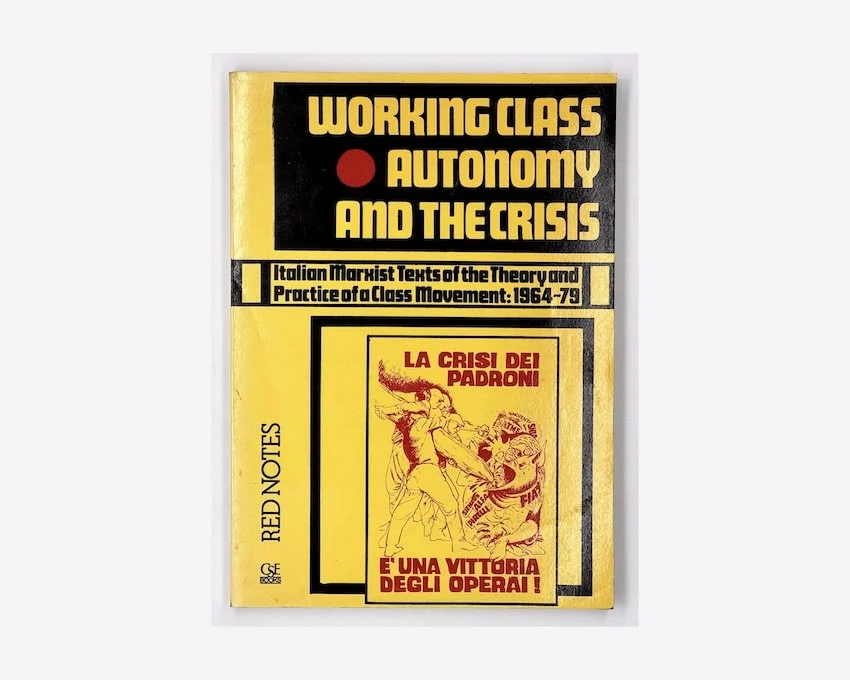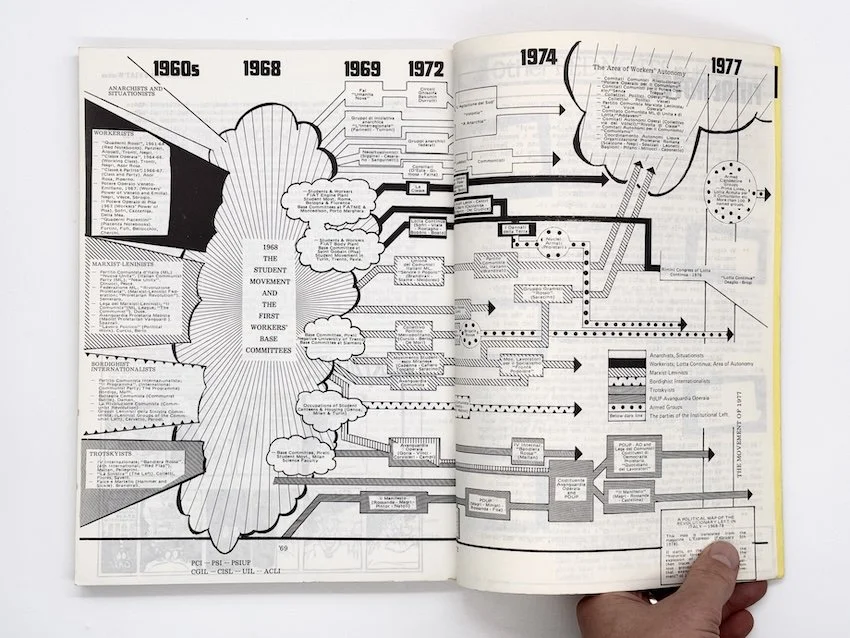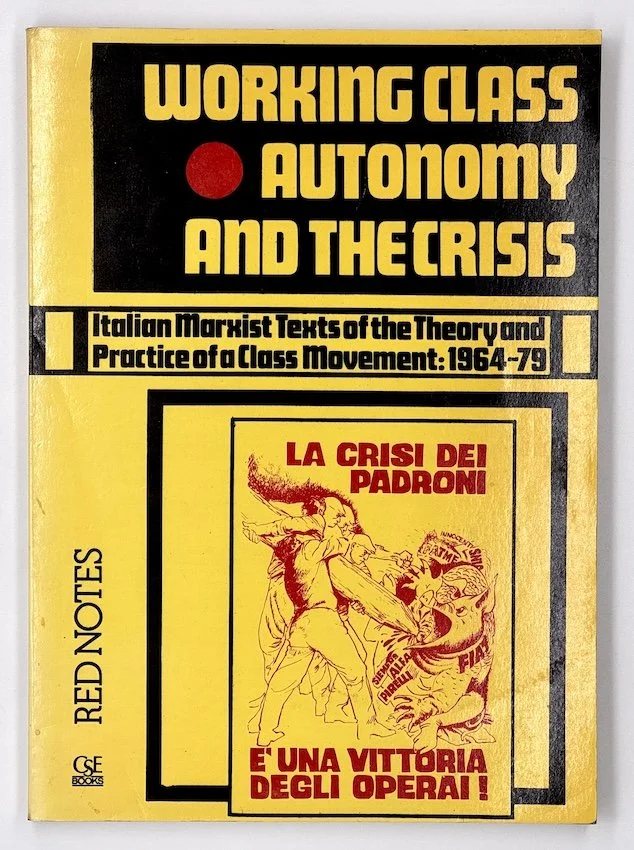 Image 1 of 4
Image 1 of 4

 Image 2 of 4
Image 2 of 4

 Image 3 of 4
Image 3 of 4

 Image 4 of 4
Image 4 of 4





Working Class Autonomy and the Crisis. Red Notes / CSE Books, 1979
Title: Working Class Autonomy and the Crisis. Italian Marxist Texts of The Theory and Practice of A Class Movement, 1964-79
Authors: Antonio Negri, Mario Tronti, Sergio Bologna et al
Publisher: Red Notes / CSE Books
Publication Date: 1979
Format: softcover
Pages: 206pp
Images: illustrated in bw
Language: English
Condition: very good
Stock Number: RB04886 GAL
“The publication of Working Class Autonomy and the Crisis by Red Notes and CSE Books gives English speaking socialists a substantial and serious account of the development of the autonomous current in Italy. [1] As such it fills an important gap, since not only are the autonomists the most numerous current to the left of the Communist Party in Italy, but their ideas are very slowly beginning to have an influence on parts of the left in Britain. Up till the publication of this book, information on the Italian autonomists has been almost non-existent outside the sensationalised and misleading reports of their activities which are occasionally reported in the press.” – From International Socialism 2:8, Spring 1980. Reprinted in International Socialism 2:92, Autumn 2001. Copyright © International Socialism.
Working Class Autonomy and the Crisis is an anthology of Italian Marxist texts published in 1979 by the Red Notes collective and CSE Books. It provides a key insight into the Italian autonomist movement of the 1960s and 1970s, which centered on the concept of working-class autonomy, or the ability of workers to organize and act independently of capitalist control.
The book was released as an act of solidarity following the arrests of hundreds of political activists in April 1979, including Antonio "Toni" Negri, who was a prominent figure in the "area of autonomy".
It served as an introduction to Italian Marxist debates for an English-speaking audience, aiming to spark similar theoretical and practical discussions within the British left.
The texts collected in the anthology explore several core ideas developed by the Italian workers' autonomy movement, also known as operaismo.
This was a central tenet of the autonomist movement, arguing that instead of demanding more and better work, the working class should collectively refuse it as a means of subverting capitalist control.
The authors developed a new method for analysing the working class, moving beyond traditional factory-based organising to include new forms of work and social struggles outside the workplace.
The movement critiqued established left-wing parties and trade unions, particularly the Italian Communist Party (PCI), for co-opting and representing working-class interests rather than empowering workers to act autonomously.
The collected texts offer an analysis of the capitalist crisis of the 1970s, arguing that economic restructuring was a direct response to working-class resistance and autonomy, particularly in the factories.
The anthology includes texts and writings from key figures of the Italian autonomist movement, including:
Antonio "Toni" Negri: A leading theorist whose writings, such as "Capitalist Domination and Working Class Sabotage," were used by authorities as evidence during the April 1979 arrests.
Mario Tronti: One of the founders of operaismo, whose 1960s texts laid the theoretical groundwork for much of the later autonomist thought.
Sergio Bologna: A significant theorist and contributor to the broader autonomist and workerist movement.
Working Class Autonomy and the Crisis had a lasting influence, serving as a vital link between the Italian autonomist movement and radical thinkers in other parts of the world. It helped popularise concepts like the "refusal of work" and "class composition" and continues to be studied by those interested in Marxist and anti-capitalist theory.
Title: Working Class Autonomy and the Crisis. Italian Marxist Texts of The Theory and Practice of A Class Movement, 1964-79
Authors: Antonio Negri, Mario Tronti, Sergio Bologna et al
Publisher: Red Notes / CSE Books
Publication Date: 1979
Format: softcover
Pages: 206pp
Images: illustrated in bw
Language: English
Condition: very good
Stock Number: RB04886 GAL
“The publication of Working Class Autonomy and the Crisis by Red Notes and CSE Books gives English speaking socialists a substantial and serious account of the development of the autonomous current in Italy. [1] As such it fills an important gap, since not only are the autonomists the most numerous current to the left of the Communist Party in Italy, but their ideas are very slowly beginning to have an influence on parts of the left in Britain. Up till the publication of this book, information on the Italian autonomists has been almost non-existent outside the sensationalised and misleading reports of their activities which are occasionally reported in the press.” – From International Socialism 2:8, Spring 1980. Reprinted in International Socialism 2:92, Autumn 2001. Copyright © International Socialism.
Working Class Autonomy and the Crisis is an anthology of Italian Marxist texts published in 1979 by the Red Notes collective and CSE Books. It provides a key insight into the Italian autonomist movement of the 1960s and 1970s, which centered on the concept of working-class autonomy, or the ability of workers to organize and act independently of capitalist control.
The book was released as an act of solidarity following the arrests of hundreds of political activists in April 1979, including Antonio "Toni" Negri, who was a prominent figure in the "area of autonomy".
It served as an introduction to Italian Marxist debates for an English-speaking audience, aiming to spark similar theoretical and practical discussions within the British left.
The texts collected in the anthology explore several core ideas developed by the Italian workers' autonomy movement, also known as operaismo.
This was a central tenet of the autonomist movement, arguing that instead of demanding more and better work, the working class should collectively refuse it as a means of subverting capitalist control.
The authors developed a new method for analysing the working class, moving beyond traditional factory-based organising to include new forms of work and social struggles outside the workplace.
The movement critiqued established left-wing parties and trade unions, particularly the Italian Communist Party (PCI), for co-opting and representing working-class interests rather than empowering workers to act autonomously.
The collected texts offer an analysis of the capitalist crisis of the 1970s, arguing that economic restructuring was a direct response to working-class resistance and autonomy, particularly in the factories.
The anthology includes texts and writings from key figures of the Italian autonomist movement, including:
Antonio "Toni" Negri: A leading theorist whose writings, such as "Capitalist Domination and Working Class Sabotage," were used by authorities as evidence during the April 1979 arrests.
Mario Tronti: One of the founders of operaismo, whose 1960s texts laid the theoretical groundwork for much of the later autonomist thought.
Sergio Bologna: A significant theorist and contributor to the broader autonomist and workerist movement.
Working Class Autonomy and the Crisis had a lasting influence, serving as a vital link between the Italian autonomist movement and radical thinkers in other parts of the world. It helped popularise concepts like the "refusal of work" and "class composition" and continues to be studied by those interested in Marxist and anti-capitalist theory.





